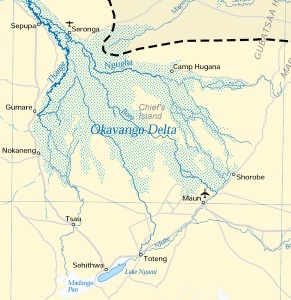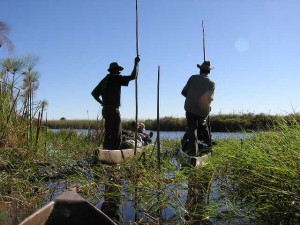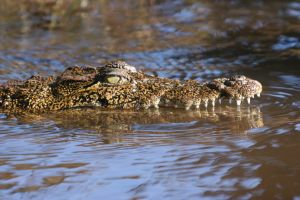As much as I’m looking forward to introducing Capetown to my travelers, the real adventure of Africa is heading into the bush for safari. The wide open spaces of the African savanna, the colors of the African sky, and the photographic hunt for wildlife seem to be universal in their appeal. Botswana is the perfect country for those pursuits. The government there has been quite aggressive in protecting its natural resources and the relatively long distances to other travel destinations and cities means their game parks are much less crowded than those in other nations. Moreover, we’re going in the shoulder season.  Our first safari stop, the Okavango Delta, is one of the unique places on the planet and one of the greatest safari venues anywhere. The Okavango is the largest inland delta in the world. All the water from the Okovango River watershed empties into and is subsumed by the Kalahari desert, none reaching the sea. It was recently voted a position as one of the Seven Natural Wonders of Africa. During the rainy season the water makes a vast, shallow, marsh - the ideal habitat for birds, crocodiles, hippos, and a plethora of other wildlife. During the dry season, larger mammals migrate in to pursue the receding waters. And where game animals go predators follow. The Moremi Wildlife Preserve, which takes up about a third of the delta, is an ideal wildlife viewing area.After flying into gateway Maun, we’ll be transported to our safari camp. But there will be time for a mokoro excursion en route.
Our first safari stop, the Okavango Delta, is one of the unique places on the planet and one of the greatest safari venues anywhere. The Okavango is the largest inland delta in the world. All the water from the Okovango River watershed empties into and is subsumed by the Kalahari desert, none reaching the sea. It was recently voted a position as one of the Seven Natural Wonders of Africa. During the rainy season the water makes a vast, shallow, marsh - the ideal habitat for birds, crocodiles, hippos, and a plethora of other wildlife. During the dry season, larger mammals migrate in to pursue the receding waters. And where game animals go predators follow. The Moremi Wildlife Preserve, which takes up about a third of the delta, is an ideal wildlife viewing area.After flying into gateway Maun, we’ll be transported to our safari camp. But there will be time for a mokoro excursion en route.  Mokoros are the traditional dugout boats favored by the local tribes people. Long, flat, and shallow, they are ideal for navigating the delta, which tends not to be deep. My original expectations for the mokoros turned out to be incorrect. I had an image of floating along at water level watching elephants, giraffe, gazelle, zebras, and predators coming to the water’s edge to drink. But the mokoro experience is much more subtle. We do float along with a water-level view but are unlikely to see much in the way of large mammals. Rather the mokoro experience is more about slipping along silently, breathing in the smells of the Okovango, and observing what I’ll call the micro wildlife experience. The only large animals we’re likely to see are hippos and crocodiles - quite exhilarating as an “eye-to-eye” encounter.
Mokoros are the traditional dugout boats favored by the local tribes people. Long, flat, and shallow, they are ideal for navigating the delta, which tends not to be deep. My original expectations for the mokoros turned out to be incorrect. I had an image of floating along at water level watching elephants, giraffe, gazelle, zebras, and predators coming to the water’s edge to drink. But the mokoro experience is much more subtle. We do float along with a water-level view but are unlikely to see much in the way of large mammals. Rather the mokoro experience is more about slipping along silently, breathing in the smells of the Okovango, and observing what I’ll call the micro wildlife experience. The only large animals we’re likely to see are hippos and crocodiles - quite exhilarating as an “eye-to-eye” encounter. Turns out, the real faunal treasure of Okavango is the bird life. There are something like 400 species of birds to be seen, many of them boasting spectacular plumage. Among them are the Crested Crane, Lilac Breasted Roller, Hammercop, Sacred Ibis, and Ostrich.
Turns out, the real faunal treasure of Okavango is the bird life. There are something like 400 species of birds to be seen, many of them boasting spectacular plumage. Among them are the Crested Crane, Lilac Breasted Roller, Hammercop, Sacred Ibis, and Ostrich.  Finally, with some luck we’ll be able to observe African Fishing Eagles and Pels Fishing Owls. Should be plenty exciting, especially for the birders in our group.
Finally, with some luck we’ll be able to observe African Fishing Eagles and Pels Fishing Owls. Should be plenty exciting, especially for the birders in our group.
Moremi Preserve, essentially a great peninsula of solid ground within the delta, is another story altogether. It is one of the great game viewing parks in all Africa and we‘ll do our big game spotting here. We should have a good chance of seeing the Big Five (with the possible exception of Rhinos - which are being hunted to extinction throughout Africa) plus, plenty of range animals like giraffe, zebra, gazelle, Lechwe, Kudu, Sable Antelope, Blue Wildebeast, springbok, warthogs, and hyenas.  Other bonuses include cheetahs, leopards, and the largest concentration of rare African wild dogs in the region. Of course there are always the ever-entertaining Chacma baboons. We’ll be maximizing our game viewing potential by varying our modes of safari. We’ll take advantage of our custom designed safari vehicles for early morning and late afternoon game drives to maximize photographic possibilities. But we’ll also venture out on foot for a walking safari, led and guarded by professional trackers. And we’ll have a night safari for spotting the nocturnal denizens of the delta. Whatever animals we happen to miss during our 3 days in Okavango will surely be found in Chobe National Park, where we’ll have another full day of game drives.
Other bonuses include cheetahs, leopards, and the largest concentration of rare African wild dogs in the region. Of course there are always the ever-entertaining Chacma baboons. We’ll be maximizing our game viewing potential by varying our modes of safari. We’ll take advantage of our custom designed safari vehicles for early morning and late afternoon game drives to maximize photographic possibilities. But we’ll also venture out on foot for a walking safari, led and guarded by professional trackers. And we’ll have a night safari for spotting the nocturnal denizens of the delta. Whatever animals we happen to miss during our 3 days in Okavango will surely be found in Chobe National Park, where we’ll have another full day of game drives.  But the highlight of Chobe is a late afternoon river cruise on the Chobe River. This time my original imaginings of water-bourn game viewing will be realized. Chobe is home to one of Africa’s biggest elephant herds and we’re guaranteed to see hundreds of the great beasts ambling down to the river for water at the end of the day. Not to mention water buffalo, more hippos and crocodiles, and innumerable game animals. It will be like the Disneyland jungle cruise only with live animals. Talk about the adventure of a lifetime. Can’t wait.
But the highlight of Chobe is a late afternoon river cruise on the Chobe River. This time my original imaginings of water-bourn game viewing will be realized. Chobe is home to one of Africa’s biggest elephant herds and we’re guaranteed to see hundreds of the great beasts ambling down to the river for water at the end of the day. Not to mention water buffalo, more hippos and crocodiles, and innumerable game animals. It will be like the Disneyland jungle cruise only with live animals. Talk about the adventure of a lifetime. Can’t wait.
